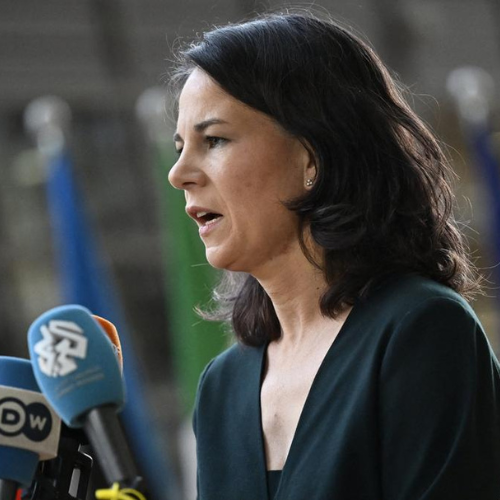The recent incident involving a Russian journalist during a press conference at the United Nations General Assembly (UNGA) has shed light on the complex and often fraught dynamics of media access and diplomatic interactions in today’s geopolitical landscape. The situation unfolded last week when German Foreign Minister Annalena Baerbock was scheduled to address German journalists in New York, amidst the high-profile gathering of global leaders.
As Baerbock made her way to the venue, a reporter from Channel One, a Russian state-controlled television network, attempted to intercept her. The Russian journalist sought to position himself alongside the foreign minister just before she commenced her statement. However, Baerbock was not inclined to entertain this request. She firmly insisted that the journalist join the other reporters, emphasizing the importance of adhering to protocol and maintaining order in the press conference. This brief yet intense exchange quickly escalated into a diplomatic issue, highlighting the underlying tensions between Russia and the West.
UN’s Response to the Russian Journalist Incident
The UN’s accreditation department swiftly responded to the incident, determining that the Russian journalist’s actions constituted a violation of the guidelines governing media access. Consequently, his access authorization was reduced. However, the UN clarified that the journalist would still be allowed to carry out his work within the building, indicating that he was not being entirely denied access to the UN premises. This decision reflects a nuanced approach to managing media conduct while recognizing the essential role of journalists in covering international affairs.
In the aftermath of the incident, Russia’s UN Ambassador Vasily Nebenzya lodged a formal complaint with UN Secretary-General António Guterres, urging the reversal of the decision regarding the Russian journalist’s access. Nebenzya argued that the reporter’s actions did not amount to harassment and characterized a confrontation he had with a member of the German delegation as an “attack” on the Russian journalist. This assertion highlights the sensitivity surrounding press freedoms and the lengths to which nations will go to defend their representatives in international forums.
Flag Switching: The Strategy Russian Oil Tankers Use to Bypass Sanctions
Implications for Media Access and International Relations
The German Foreign Office refrained from making public comments regarding the incident when approached by journalists. This silence may be strategic, reflecting an understanding of the potential diplomatic fallout from engaging in a public dispute over media access. However, it also highlights the broader challenges facing diplomats in a climate where media interactions can rapidly become contentious.
This incident is not merely an isolated event but rather part of a larger narrative concerning the relationship between Russia and Western nations, particularly Germany. Media access has become a contentious issue, especially in an era where state-controlled narratives often clash with independent journalism. The confrontation at the UN reflects the ongoing struggle over the legitimacy of journalistic practices and the rights of reporters to engage with political figures.
Furthermore, this episode raises critical questions about the role of international organizations like the UN in regulating media conduct. While the UN must uphold standards of professional behavior among journalists, it also bears the responsibility of ensuring that press freedoms are respected. The balancing act between maintaining order at press conferences and allowing for journalistic inquiry is a delicate one, particularly in high-stakes environments like the UNGA.
The geopolitical implications of this incident cannot be overstated. As tensions continue to simmer between Russia and the West, moments like this serve as flashpoints that can exacerbate existing rifts. The fact that a seemingly routine press interaction involving a Russian journalist could escalate into a diplomatic issue speaks to the charged atmosphere in which international relations are conducted today.
In conclusion, the incident involving the Russian journalist at the UN press conference with Baerbock exemplifies the complexities of media interactions in a globalized world. As nations navigate the challenges posed by state-controlled media and the need for transparency, the UN must remain vigilant in its role as a facilitator of dialogue while upholding the rights of journalists. Moving forward, it is essential for all parties involved to foster an environment that encourages open communication and mutual respect, ensuring that the media can operate freely and effectively within the corridors of power.


